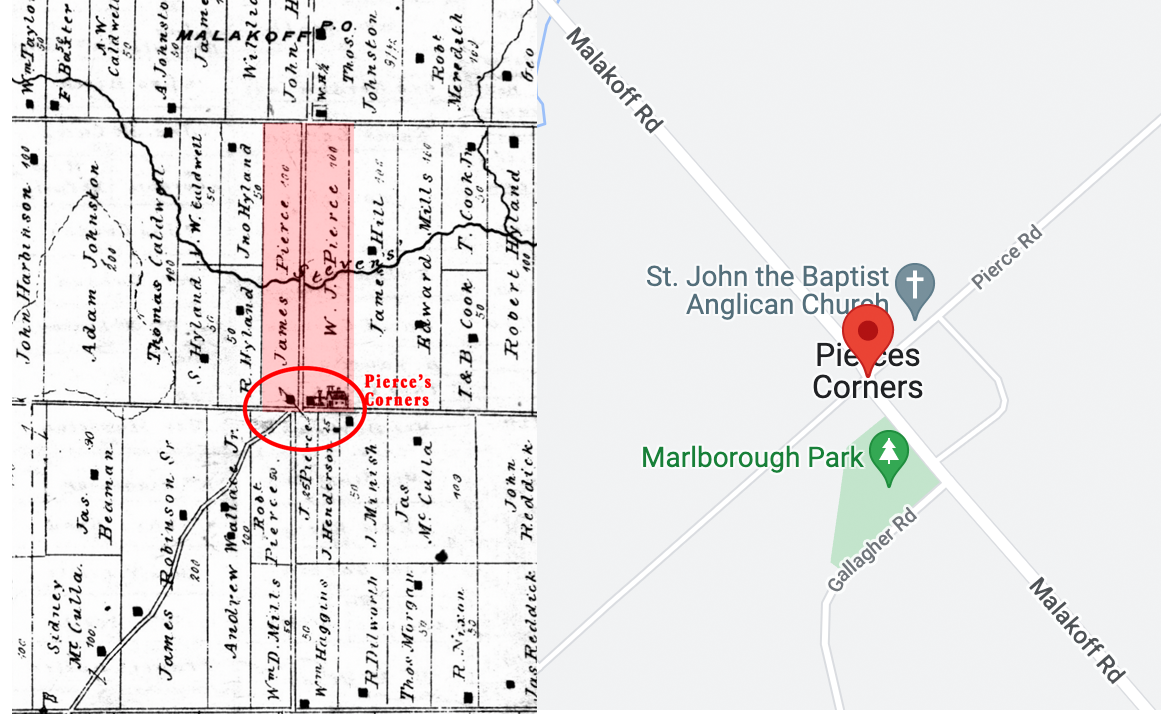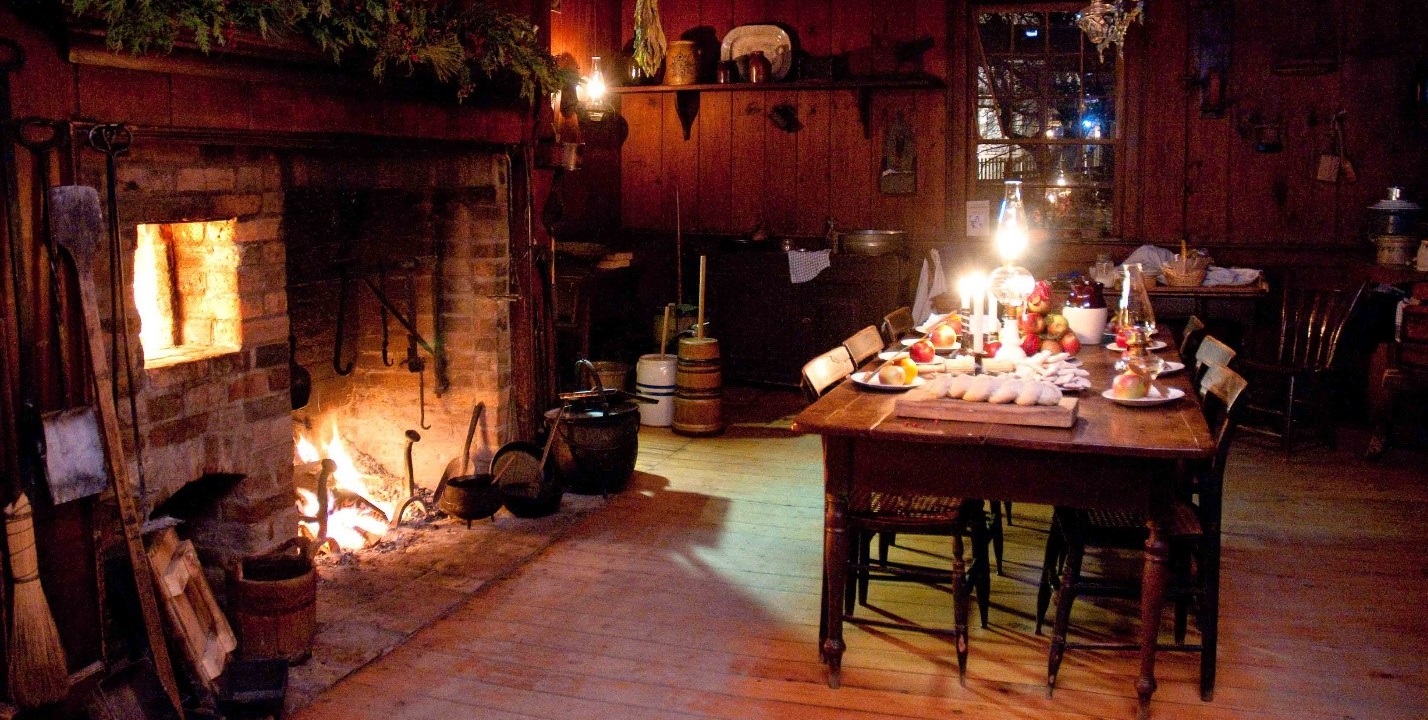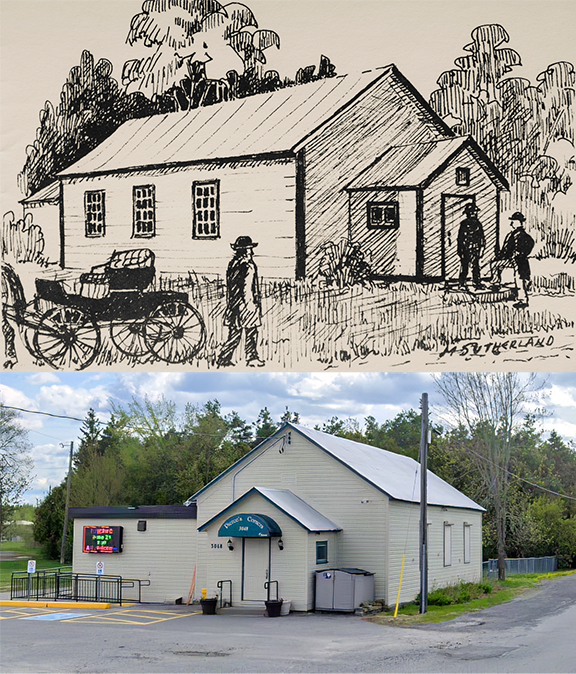The Pierces of Pierce’s Corners
The items below are drawn from the Tweedsmuir history North Gower, Volume 1, and from the collections of the Rideau Branch, City of Ottawa Archives, North Gower. Used with permission.
There were giants in Marlborough Township from the beginning of the settlement. The giants were two brothers: James and John Peirce, farmers and tavernkeepers both.
James had the south-eastern half of Lot 7 in Concession 5; John the south-eastern half of Lot 6 in the same concession. Between the two farms ran the sideroad between Beckett's Landing and Malakoff; in front of both farms ran the Concession road between Concessions 4 & 5. From the intersection of the two roads – an intersection known as "Peirce's Corners – towards the south ran a road that pre-dated the Official Survey of 1791. That old road traversed the "Seven Mile Bush" to the Rideau River two miles to the southwest from Beckett's Landing. It had been a part of the ''Long Island Road" to Manotick that cut across an angle of the Rideau; it might well have originated with the Indigenous people as they followed the Rideau River to its junction with the Ottawa.
The Pierces operated their farms separately, but the tavern jointly. The tavern was first on the north-west corner – owned by James – but, after a fire was erected on the land of John, who had the north-east corner. The tavern was well known for food as good as it was plain; for being as comfortable as it was clean; for being as orderly as only two giants could keep it.
As tavern-keepers, the Pierce’s were well known for another reason: They would not permit new settlers to be defrauded or oppressed – as a certain transport agent from Brockville learned to his cost.
New settlers usually came up the Saint Lawrence River, and if they proposed to settle along the Rideau River east of Portland Lake, they would land at Brockville and proceed overland to the farms they had selected. If they had brought horses – which would happen rarely – they would travel on their own saddles or in their own wagon. As a rule, however, they would bargain with a transport agent for conveyance to their respective destinations.
A few transport agents were not too scrupulous; that is, they would obtain, in advance, payment for the full journey, but dump their passengers at some point far short of their destination.
One agent was unlucky enough to ditch his passengers near the Peirce tavern, although their ·way had been paid to a point in Goulbourn more than ten miles beyond. John Peirce, overhearing the dispute, intervened: ''Mr. Agent, you will take these settlers to their new homes, and I will see that you do so. For I shall go with you, and you will bring me home again at no cost to me or the new settlers. The agent did not dare refuse. The new settlers reached their destination.
John Peirce had two sons: John junior, who inherited the property, and George. George was a burly and cheerful youngster who loved work, but loved fun a little better; sometimes lumbering in the "shanties,'' sometimes working for neighbours; sometimes buying a farm, only to sell it again and move on.
George Peirce happened by chance to be in the congregation when a local preacher, Hugh Brownlee, preached in the Methodist church in Wellington, (since the 1860s called Kars.) The sermon was long and dramatic, the succeeding silence as dramatic, if not as long. The silence was broken by the voice of George Pierce; "Hugh, they tell me the price of butter is up a couple of cents".
Hugh Brownlee was not rendered happy by this untimely reference to his secular occupation of produce-dealer and, in no forgiving spirit, laid a charge against George, namely disturbing the peace of Her Majesty's loyal subjects. The case was heard before a Justice of the Peace, James Craig, of North Gower.
Mr. Craig's words were harsh; the offence was a serious one, and the penalty was inescapable; George was fined one dollar. The formalities of a justice satisfied, James Craig found himself at the side of George Pierce when they entered the bar of Johnston's Hotel in North Gower, but was still stern of mien and word: "George, your offence might well have entailed a heavy penalty. If you repeat the offence, I will have no choice but to prescribe that penalty. Here is your dollar." John Peirce junior had two sons, (probably more, but information is not available long after the event.) These sons were Robert and David. Robert died years ago; David , who married a Miss McMullen




